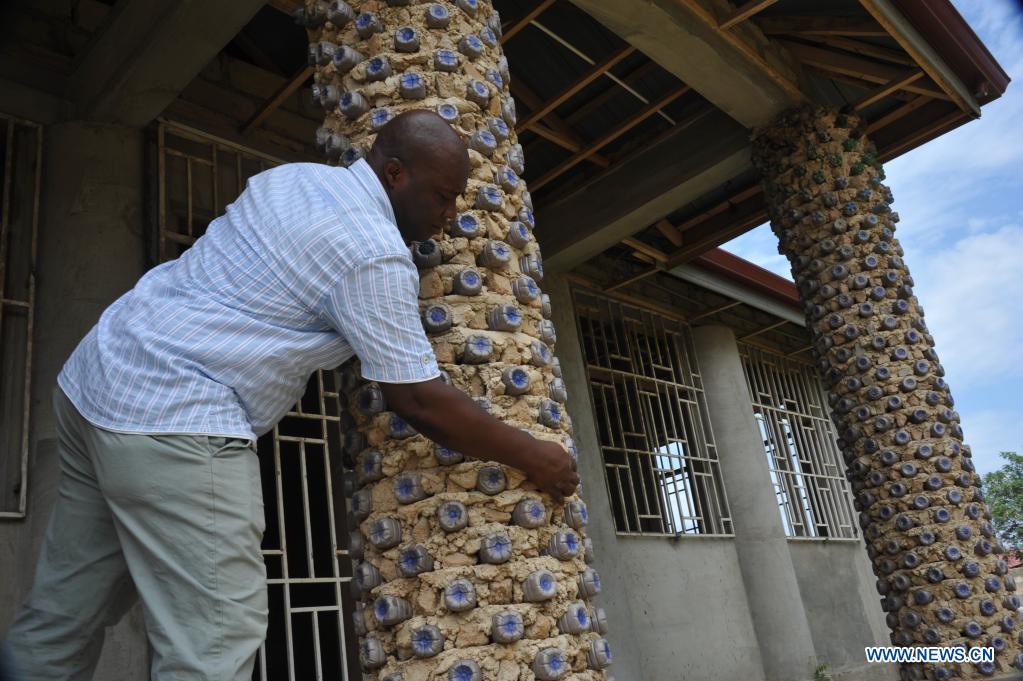
Martial Zohoungbogbo shows recycled plastic bottles filled with soil, which are used as bricks for building a community library, in Accra, Ghana, on June 24, 2021. Martial Zohoungbogbo, an architect who holds a dual citizenship of Ghana and Benin, built a community library with 45,000 recycled plastic bottles on the outskirts of Accra. (Photo by Seth/Xinhua)
by Xinhua writer Xu Zheng
ACCRA, July 12 (Xinhua) -- Sitting at a campus in Kokrobite, a fishing community on the outskirt of Ghanaian capital, a newly-constructed building stood out from many humble structures around as it was built with 45,000 recycled plastic bottles.
Yet to be fully-decorated, the unique house has the mostly frequently visited place by locals, who have already been told that the building would be a free multi-media library for their children once completed.
Martial Zohoungbogbo, who holds a dual citizenship of Ghana and Benin, built the "bottle house" with the money raised by himself and under thee help of many locals. Standing in the middle of the house, he couldn't help envisaging the library's future.
"The kids will have access to the Internet, they will read books and have classes together, and they will finally have a place to entertain themselves," he told Xinhua.
Kokrobite is one of the most less-developed communities in the region, where most of the families rely on traditional fishing and can't afford better education for children.
Martial, who came to this community 30 years ago, picked up the technique of building architectures with plastic bottles from a German architect. After learning the fact that local children had long been struggling with inadequate spaces for learning, Martial made up his mind to use his architecture technique to make a change.
The building mainly consists of two sizes of plastic bottles, according to Martial, the larger bottles filled with soil and tightly bound by ropes were used as "bricks" for walls, while the smaller ones were laid firmly layer by layer to be pillars.
Before getting stared to build the library, Martial has already had a project completed with the technique -- a public school classroom. He spent almost four months on building the architecture, and it was applauded by many locals.
For Martial and his partners, besides money, the shortage of recycled bottles and labor was the largest obstacle when they started building the library. Fortunately, his idea was soon echoed by many, including a recycling company that agreed to sell bottles to them, and school kids from the community who volunteered to fill the bottles.
"We got the bottles refilled with different types of soil, even the soil from the gutter. Then press it and make it more compact, then the refilled bottle will be a solid brick you need for the construction. Then we use clay, cement and other materials to move on," he said.
Martial said the "bottle house" was not only environmental-friendly, but also strong and safe, and most importantly, easy to repair and affordable for ordinary citizens.
He said that some poverty-stricken parts in the West African country can't provide enough classrooms for kids so that some teachers still have to gather students to sit under trees for teaching and learning.
"We are worried about them, and it is time to use what we have to solve this problem," said Martial, adding he is confident that their teaching conditions will be improved on condition that such "bottle house" technique can be introduced there.
Martial told Xinhua that he has an even bigger plan for this library once it is completed, including putting on an exhibition themed on biology for children and organizing seminars for parents in the community to help increase their awareness towards the importance of education.
Asafoatse Nii Ayi Otumfuo, a citizen in the community, told Xinhua that Martial's "bottle house" will change a lot of things in the community and his dedication to children with humble backgrounds is also exerting positive influence on the society.
"I will always support him, because he is giving our children education, which I believe, is much better than money," said Otumfuo, urging that the youth in the country should take advantage these opportunities to develop themselves.
Martial said the "bottle house" is now catching wider attention as more people from Europe and Asia have contacted him and showed their willingness to learn. He then appealed to the government to offer more support to the project and adopt more variable solutions to housing problems facing the country.
"When it comes to the 'bottle house', I have taken it as my career," he added. Enditem